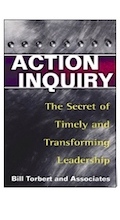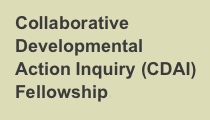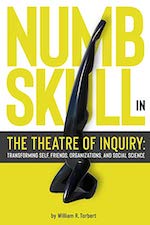Action Inquiry
Action inquiry is a lifelong process of transformational learning that individuals, teams, and whole organizations can undertake if they wish to become:
- increasingly capable of listening into dangers and opportunities of the present moment from which the future emerges; and
- increasingly capable of performing in effective, transformational, and sustainable ways.
Action inquiry can gradually become a moment-to-moment way of living whereby we attune ourselves through inquiry – alone, with intimate others, and in public – to acting in an increasingly timely and wise fashion.
Bill Torbert Talks About Action Inquiry and His Work Today
Who can practice action inquiry, Bill, and how is it unique?
In principle, anyone in any family or organization can practice action inquiry. Gradually, they develop first the reliable capacity to make incremental (single-loop) changes to increase timely, effective action. Next (though few people or organizations today progress this far) comes the reliable capacity to make transformational (double-loop) changes; still later, a few humbly face the challenge of ongoing (triple-loop) listening into the dark – into the present moment and into the “Volume of all Possibilities” from which the future emerges.
How has action inquiry impacted the developmental work done with executives and leaders?
You can get a good sense of the answer to your first question by reading the April 2005 Harvard Business Review article “Seven Transformations of Leadership” or my 2004 book written with some of the same associates who today make up the corps of Action Inquiry Fellows. In short, we have shown statistically that leaders who voluntarily engage in intense action inquiry activities during their workdays and special retreat workshops transform to later action-logics. We have also shown statistically that CEOs at the Transforming action-logic and later are the only ones who are reliably successful in promoting organizational transformation. (See research summary of action inquiry findings, Integral Leadership Review, November 2017.)
Today, this work continues primarily through consulting, coaching, research and workshops available through the Global Leadership Associates
What assessments are you now using in conjunction with your leadership development programs?
Quantitatively, we base our leadership development work on the Global Leadership Profile, our version of the most thoroughly validated transformational leadership measure in the social scientific literature (Integral Leadership Review). Seeking this form of feedback on one’s current leadership action-logic is often the beginning for adults of intentional commitment to their own further development….
Since June 2008, you’ve been Professor Emeritus of Leadership at the Carroll School of Management at Boston. What is the main thrust of your work today, in 2020?
Now that I myself am 76, I’m intrigued by the transformations that we can encounter in our later years… and that I believe global society is today also confronting. I call this the “Third Age.” I believe that as human civilization enters the global era, it is also entering its Third Age. Humanity was in its First Age of Dependence until about 1500AD. Then markets, democracies, the empirical sciences, and technology began to generate the Second Age of Independence that most of us as individuals experience during our middle years. The transformation toward our Third Age can move us toward Inter-Independence – toward the exercise of mutual inquiry, power, and love – toward full responsibility for our life as a whole with others and our home planet.
I am carrying on this deepest action inquiry into Inter-Independence primarily through by-invitation ‘Workparties’. These occasions, when all participants function as co-leaders, challenge us to practice (and to see how we fail to practice) mutually-transforming inquiry, love, and power with one another ongoingly. For those of us late in our Third Age, the question arises, how do we wish to face death, and can death itself become our ultimate transforming moment if faced consciously in the company of friends?
Surprisingly, action inquiry is a virtually unknown process… perhaps because learning how to practice it from moment-to-moment is no easy trick. Action inquiry is not a process that can be followed in an imitative, mechanical way, learning a few ideas and imagining that parroting them back to others occasionally means one is doing action inquiry. Rather, action inquiry is a way of learning anew, in the aliveness of each moment, how best to act now. The source of both its difficulty and its potential is that action inquiry requires making ourselves, not just others, vulnerable to inquiry and to transformation.








